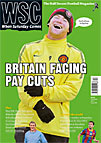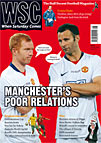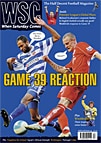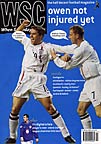 Dear WSC
Dear WSC
I would like to ask my fellow readers if their clubs have something called “The Nardiello Factor”. The Nardiello Factor is a phenomenon where a striker’s popularity is based in a large part on the exotic nature of his name. At Barnsley we have seen no finer example of this than in recent months with the arrival of Jerónimo Morales Neumann. My fellow Tykes have been beside themselves at the thought of this player, and have wondered how Mark Robins can possibly limit him to just warming the bench. This opinion seems based on nothing more than the fact that he has a name that would be good to shout out when (if) he scores. Our Jerónimo accordingly scores a Nardiello Factor rating of nine (the maximum score is ten). Contrast this with Chris Woods, our loanee from West Brom. He scores a paltry NarFac rating of four. Were he to slightly change his name to Christiano Woodaldo he would up his NarFac rating to eight but, alas, this is not to my knowledge due for consideration. As a consequence the support from the terraces has been a little limited to date. Liam Dickinson scores a NarFac rating of one, though I am willing to concede that, even if he changed his name to Galileo Figaro Magnifico, he’d do well to register a NarFac rating of five. His yellow boots have had a negative impact.
Ian Marsden, Belper
Search: ' Reims'
Stories
 Dear WSC
Dear WSC
Congratulations on the article about match-fixing (Crimes and misdemeanours, WSC 283). Paul Joyce did a superb job reviewing the many different cases of corruption in European football. As the German police investigation began, partly because of the controversy around my book, The Fix, I did want to take him up on one issue. He mentioned that “Germany lies second in the match-fixing table” – this is true but it is not because corruption is more prevalent in German football. Rather it is because the German authorities are now, after years of denial, actually taking the issue seriously and are vigorously investigating match-fixing – and the more they investigate, the more they find. This proactive attitude is in stark contrast with British football authorities who seem to have adopted the attitude of “don’t know, don’t want to find out”. The circumstances in British football are similar to other European countries: thousands of relatively badly paid players; lots of poor clubs and lots of interest in the gambling markets. However, the British authorities have not yet fully woken to the dangers. I can only hope that they do before they discover a similar problem to the one in Europe.
Declan Hill, Oxford
 After showing early potential, unreasonable expectation and an unlikely transfer fee took their toll. James Eastham looks back
After showing early potential, unreasonable expectation and an unlikely transfer fee took their toll. James Eastham looks back
Recollecting the transfers that took place across Europe during the 2001 close season, you can safely say there was no credit crunch in the world of football eight summers ago.
 After seven titles in ten seasons St Etienne failed to go onto greater things, but Michel Platini's star would keep rising by James Eastham
After seven titles in ten seasons St Etienne failed to go onto greater things, but Michel Platini's star would keep rising by James Eastham
The long-term significance
St-Etienne, the swashbuckling side of the 1970s, won their third consecutive title and seventh in ten seasons – but this triumph marked the end of their dynasty. A single league title followed, in 1981, when Michel Platini was their talisman – and then nothing since. In their famous green shirts they became the first French club since Reims in 1959 to reach the European Cup final, losing 1-0 to Franz Beckenbauer’s Bayern Munich after hitting the woodwork twice.
 It looks like Sheffield, but the Eindhoven derby hasn't been on a level playing-field for 50 years. Ernst Bouwes goes in search of PSV's forgotten neighbours
It looks like Sheffield, but the Eindhoven derby hasn't been on a level playing-field for 50 years. Ernst Bouwes goes in search of PSV's forgotten neighbours
When he saw Jan Louwers bending over to adjust the ball on the penalty spot, Lieuwe Steiger checked his position on the goalline once more by looking at one of the posts. Watched by a capacity crowd (and then some), the PSV keeper had been beaten by local rivals EVV once that afternoon. Now the score stood at 1-1. The losers of this local derby could be out of the championship play-offs for 1955, the first year of Dutch professional football. When Steiger looked up again to prepare for the penalty, he saw Louwers grinning sheepishly. There was a space on the penalty spot where the ball should have been. The Eindhoven striker had already taken the kick, hoping he could surprise the keeper. So he did, almost hitting a photographer with his miscue.